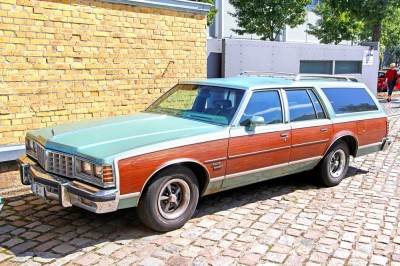The History of the American Station Wagon
 If you're in your forties or have seen movies like National Lampoon’s Vacation, then you know how important station wagons have been in the history of cars in the United States. Whether you went on a family trip in a 1968 Mercury Commuter wagon or maybe to your aunt's house in a 1959 Ford Country Sedan Wagon, if your family ever owned when of these American "beasts", then you know about the lore and legend of the station wagon.
If you're in your forties or have seen movies like National Lampoon’s Vacation, then you know how important station wagons have been in the history of cars in the United States. Whether you went on a family trip in a 1968 Mercury Commuter wagon or maybe to your aunt's house in a 1959 Ford Country Sedan Wagon, if your family ever owned when of these American "beasts", then you know about the lore and legend of the station wagon.
At Fix Auto Indio, we have worked on a few stations over the years, but now the soccer moms in here Indio, CA all drive vans and SUVs. Recalling the old days when station wagons were all the rage is fun and a fond blast from the past!
Most folks call them station wagons or suburban, but they are also known as "depot hacks" or "shooting breaks". Station wagons started out as being utility vehicles, when they first became prevalent back in the 1920s. But, in the 1950s they were designed for two-car families, where the station wagon became the daily workhorse--delivering the children to school and other activities, buying groceries and going on long trips to idyllic locations.
Why were the very first station wagons called "depot hacks"? Well, because in the 1920s they worked principally in and out of train depots as taxi cabs (aka "hacks") The storage areas in these early station wagons made them perfect for loading and unloading large amounts of luggage. Back then, of course, everyone traveled via trains and station wagons could easily carry people and lots of luggage from the train station to home and vice versa.
Some automotive historians say that the first legitimate station wagon was the 1923 Star- the very first, mass-produced station wagon and the ending with the 1996 Buick Roadmaster Estate Wagon. This definition of what a station wagon looks like refers to its stretched wheelbase, rear-wheel drive and a sedan or hardtop chassis.
Although there are fewer and fewer station wagons on the roads in this country today, they still have a huge following and many avid collectors that love these old stations wagons. People like them because they remind them of a simple time as these old workhorses carried families in safety for nearly a century. So, give a nod to the station wagon and much respect for the role they played in the U.S. since the 1920s!
Sources: StationWagon.com, MSN and AOL


 If you're in your forties or have seen movies like National Lampoon’s Vacation, then you know how important station wagons have been in the history of cars in the United States. Whether you went on a family trip in a 1968 Mercury Commuter wagon or maybe to your aunt's house in a 1959 Ford Country Sedan Wagon, if your family ever owned when of these American "beasts", then you know about the lore and legend of the station wagon.
If you're in your forties or have seen movies like National Lampoon’s Vacation, then you know how important station wagons have been in the history of cars in the United States. Whether you went on a family trip in a 1968 Mercury Commuter wagon or maybe to your aunt's house in a 1959 Ford Country Sedan Wagon, if your family ever owned when of these American "beasts", then you know about the lore and legend of the station wagon.